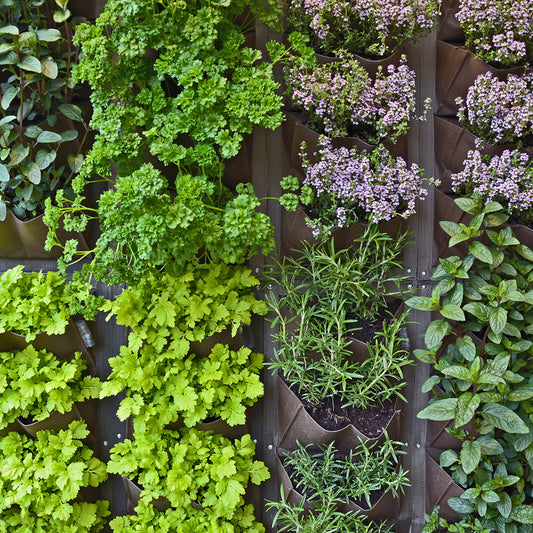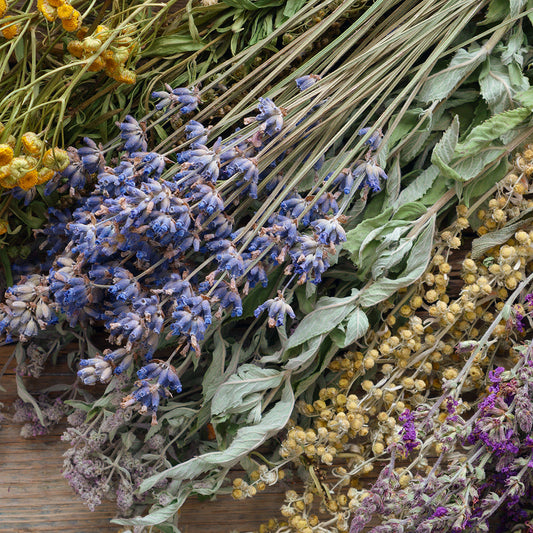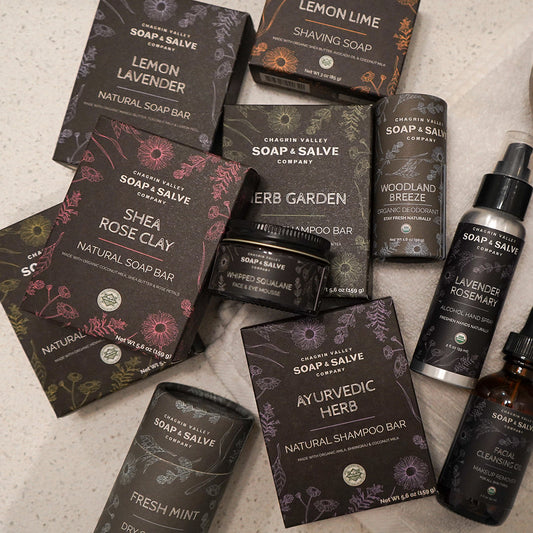Natural Herbs for Skin Care
How We Formulate Our Botanical Skin Care Products
Years before we started Chagrin Valley Soap, my husband and I were growing herbs, drying herbs, infusing herbs and creating herbal blends for culinary use.
 We have a large herb garden and often use our own fresh and dried herbs to make herbal-infused vinegars, herbal-infused oils, and blend herbal rubs for cooking.
We have a large herb garden and often use our own fresh and dried herbs to make herbal-infused vinegars, herbal-infused oils, and blend herbal rubs for cooking.
As Chagrin Valley Soap grew, my interest morphed into researching the benefits of herbs in skin care. So our next few blogs will be devoted to some herbal basics for culinary and therapeutic use.
Our SKIN, remarkably thin and amazingly complex, cannot discriminate between synthetic and natural, or between harmful and beneficial.
How did we take care of our skin before synthetic commercial cosmetics and skincare products?
We looked to nature!
For centuries, healing herbs and botanicals have been used to support healthy skin, enhance the skin’s appearance, treat skin problems, and improve skin quality.
Every single day of our lives, our skin acts as a shield between us and the world. Our skin is our first line of defense against the outdoor elements like air pollution, as well as other chemicals that touch our skin in laundry detergents, personal care products, and even swimming pools.
I love using whole natural plant material instead of extracts to formulate skin and hair care products. When we use plants in their whole, unadulterated form, we preserve the natural goodness, and our bodies, which are part of the natural world, can more easily recognize and absorb the benefits.
Plants have a life force of their own. We believe that isolates and extracts can not capture the skin nourishing properties of whole plant ingredients. Once we start extracting single compounds, we alter the natural synergy that plants have to offer.
We all want healthy-looking skin. Natural herbs and botanicals can help because they rely on their natural therapeutic properties, not synthetic chemicals.
Our motto about our skin care products really says it all:
Harnessing the Power & Simplicity of Nature®
What is an Herb?
The Oxford English Dictionary’s definition of an herb is
“a seed-producing annual, biennial or perennial that does not develop persistent woody tissue but dies down at the end of a growing season. They are plants or plant parts that are valued for their medicinal, savory, or aromatic qualities.”
 In the culinary world, the term "herb" usually refers to the leafy green parts of a plant. Other parts, including seeds, berries, bark, root, and fruit, are generally called spices.
In the culinary world, the term "herb" usually refers to the leafy green parts of a plant. Other parts, including seeds, berries, bark, root, and fruit, are generally called spices.
A great example of the differences in culinary terminology is the coriander plant (Coriandrum sativum). Its fresh or dried leaves are referred to as Cilantro or Chinese Parsley. We use cilantro in guacamole and ceviche dishes.
But the brown seeds from the same plant, with their warm, nutty, spicy flavor are known as the spice, coriander.
In medicinal use, any of the parts of the plant might be considered "herbs", including leaves, roots, flowers, seeds, resin, bark, and even berries.
At Chagrin Valley Soap and Salve, our goal is to create wholesome natural products, inspired by traditional and contemporary herbal wisdom.
How Do We Formulate Our Natural Skin Care Products?
FIRST
We research the herbal properties that are desirable for use in skincare. Although the benefits of herbs have been passed down for generations, science has now been able to isolate many of the therapeutic properties of herbs by extracting and analyzing their components.
Basic Herbal Properties for Skin Care:
Emollient: Herbs with emollient properties soften, soothe, condition and protect the skin. These herbs have a high content of mucilage, a complex mixture of polysaccharides that become gelatinous when mixed with water. Mucilage, particularly good on sensitive areas, gives skin a silky feel and attracts and retains moisture. In hair care, mucilage coats and softens the hair shaft and provides slip for detangling. Marshmallow and Burdock roots, and Plantain are rich in mucilage.
Soothing: For sensitive skin, we look for herbs that are healing and soothing due to their anti-inflammatory properties. Calendula, Chamomile, Mullein, Plantain, and Lavender are good examples.
Healing: Many herbs have healing properties due to their antibacterial, antiviral, and anti-inflammatory properties.
 Black Walnut, Calendula, Comfrey, Goldenseal, Helichrysum, Lavender, Mullein, Plantain, St John's Wort, and Thyme are great healing herbs.
Black Walnut, Calendula, Comfrey, Goldenseal, Helichrysum, Lavender, Mullein, Plantain, St John's Wort, and Thyme are great healing herbs.
Astringents: Astringents cleanse the skin, tighten pores and can even help reduce acne by controlling oils and removing impurities that usually lead to breakouts. They are great for problem skin. Although over-the-counter astringents often contain alcohol, we can get great astringent properties from herbs like Thyme, Lemongrass, Strawberry Leaf, Elder Flowers, Dandelion, and Sage.
Stimulating: Stimulating circulation helps with dry skin, mature skin, musculoskeletal aches, and even scalp problems. Arnica, Basil, Cayenne, Chamomile, Fenugreek, Horsetail, Nettle, Lavender, Parsley, Rosemary, and Peppermint are good stimulating herbs.
Toning: Skin toners are mild products that help firm, tighten and hydrate skin. Toners are great for dry skin and aging skin too. Some herbal examples are Basil, Lemon Balm, Thyme, Elder Flowers, Strawberry Leaf, Juniper Berries, Rose Petals, and Yarrow.
Antioxidants: Topical antioxidants can improve cell function, improve elasticity and help with skin problems, which promotes healthier, youthful-looking skin. Green Tea, Hibiscus, Sage, and Holy Basil are some examples.
Obviously, many herbs fit into more than one category. Furthermore, when developing a product for a specific skin condition we use a variety of herbs with a variety of therapeutic properties to achieve the best results.
For example, to create the most effective product for eczema, we would use herbs that are soothing, emollient, anti-inflammatory, and cell-stimulating. Then we add Chickweed, which helps soothe the itchiness that comes with irritated skin conditions.
SECOND
We decide: What goal are we trying to achieve with our herbal concoction?
 For example:
For example:
For the Body: relaxation, joint relief, muscle soreness, congestion
For the Skin: irritated skin, acne, dry or oily skin, sensitive skin, aging
For the Hair: dandruff/irritated scalp, tangles, hair loss, dry or oily hair, color
THIRD
Once we know our goal and what herbs we will use, we ask, “how do we want to use the herbs?”
In other words, “What is the best method of preparation and dispensing our herbal preparation?” It could be a salve, a body oil, or maybe a vinegar infusion!
Come back and join us over the next few weeks as we discuss . . .
Fresh vs Dried Herbs: How to Dry, Preserve and Store Fresh Herbs
How to Choose Good Quality Herbs
Vinegar Herbal Infusions
Oil Herbal Infusions









